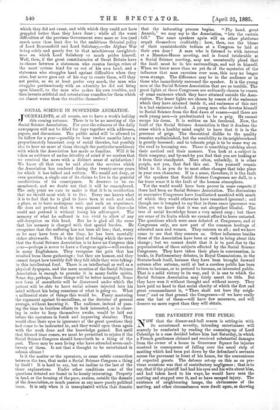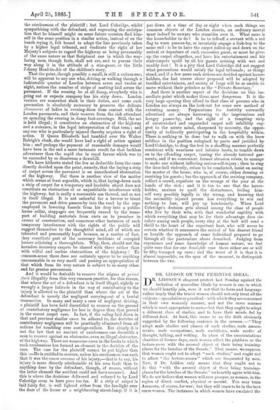THE PAVEMENT FOR THE PUBLIC. N OW that the dinner-and-ball season
is setting-in with its accustomed severity, intending entertainers will scarcely be comforted by reading the summing-up of Lord Coleridge in a case decided before him last Saturday, in which a French gentleman claimed and received substantial damages from the owner of a house in Grosvenor Square for injuries received in consequence of falling over the usual strip of matting which had been put down by the defendant's servants across the pavement in front of his house, for the convenience of expected guests. The defence set-up on this as on previous occasions was that of contributory negligence ; that is to say, that if the plaintiff had had his eyes and his wits about him, and had taken heed to his ways, he would have seen the matting and stepped over it, and so have escaped injury. The existence of neighbouring lamps, the obviousness of the matting, and other circumstances were dwelt upon, as showing the carelessness of the plaintiff ; but Lord Coleridge, whilst sympathising with the defendant, and expressing the anticipation that he himself might on some future occasion find himself in the same position in a similar action, instead of on the bench trying it, felt bound to adopt the line previously taken by a higher legal tribunal, and vindicate the right of her Majesty's subjects to regard the highway as being presumably of the same nature as that Scriptural one in which the wayfaring men, though fools, shall not err, and to pursue their -way along it in the attitude of a star-gazer, or the little Johnny Head-in-Air of the children's story.
That the point, though possibly a small, is still a serious one, will be apparent to any one who, driving or walking through a fashionable quarter of London between seven and twelve at night, notices the number of strips of matting laid across the pavement. If the evening be at all damp, everybody who is going out or expects company has his strip down. London vestries are somewhat slack in their duties, and some such precaution is absolutely necessary to preserve the delicate chaussures of ladies in evening-dress from contact with the London pavements, and their wearers from the risk attendant on spending the evening in damp foot-coverings. Still, the act is held illegal ; it constitutes an obstruction of the highway and a nuisance, in the legal interpretation of that term ; and any one who is particularly injured thereby acquires a right of action. If Queen Elizabeth had tumbled over Sir Walter Raleigh's cloak, she would have had a right of action against him ; and perhapsthe payment of reasonable damages would have been in the end a more fortunate result for that luckless adventurer than the rapid rise in royal favour which was to be succeeded by so disastrous a downfall.
We have hitherto stated the law as deducible from the cases directly decided upon the point, namely, that the laying a strip of carpet across the pavement is an unauthorised obstruction of the highway. But there is another view of the matter which seems at least arguable, which is, that laying-down such a strip of carpet for a temporary and laudable object does not constitute an obstruction of or unjustifiable interference with the highway, but is really a reasonable use thereof, and so not in itself illegal. It is not unlawful for a brewer to bisect the pavement and drive passers-by into the road by the rope employed in lowering barrels from his dray into a publichouse cellar, stoppages are frequently caused by the transport of building materials from carts on to premises in course of construction, and numerous other instances of such temporary interference with the rights of the public will suggest themselves to the thoughtful mind, all of which are tolerated and presumably legal because, as a matter of fact, they constitute part of the necessary incidents of occupied houses adjoining a thoroughfare. Why, then, should not the harmless necessary carpets be classed with these rather than with wilful and useless obstructions of the highway ? To common-sense there does not certainly appear to be anything unreasonable in so very small and passing an appropriation of that which from its very nature is subject to so many other and far greater perversions.
And it would be desirable to remove the stigma of prinui facie illegality from this very common practice, for this reason,
that where the act of a defendant is in itself illegal, rightly or wrongly a larger latitude in the way of contributing to the injury is allowed to the plaintiff than where the act of the defendant is merely the negligent carrying-out of a lawful transaction. In many and many a case of negligent driving, a plaintiff has been held disentitled to recover on the ground of contributory negligence far less in degree than that proved in the recent carpet case. In fact, if the ruling laid down in that and previous similar cases be adhered to, the doctrine of contributory negligence will be practically eliminated from all actions for tumbling over carriage-rollers. But clearly it is not the law that no amount of carelessness can disentitle a man to recover against an obstructor, even an illegal obstructor, of the highway. There are numerous cases in the books in which such carelessness has formed an element in the decision of the case. The case for the plaintiff cannot be put higher than
this :—He is entitled to recover, unless his carelessness was such that it was the causa causans of his injury,—that is to say, his
injury is more directly attributable to his own fault than to anything done by the defendant, though, of course, without the latter element the accident could not have occurred. And this is where the decisions delivered and referred to by Lord Coleridge seem to have gone too far. If a strip of carpet is laid fairly flat, is well lighted either from the fan-light over the door of the house or a neighbouring street-lamp, if it is put crown at a time of day or night when such things are common objects of the London streets, an ordinary mortal must indeed be unwary who stumbles over it. What more is the householder to do ? Is he to tell-off a servant with a red flag to warn passers-by, or invariably engage a link-boy to the same end ; is he to have the carpet rolled-up and down on the arrival or departure of each successive guest, or must he giveup the carpet altogether, and have his entertainment and his stair-carpets spoilt by all his guests arriving with wet and muddy feet ? It is a pity that Lord Coleridge did not suggest what precautions would satisfy the legal tribunals ; as things stand, and if a few more such actions are decided against householders, the last course above proposed will be adopted by terrified entertainers, and society at large will be as unable to move without their goloshes as the "Private Secretary."
And there is another aspect of the decisions on this immediate point which makes them most dangerous. It is the very large opening they afford to that class of persons who in London are always on the look-out for some new method of
extorting money. Preparations for festivity outwardly advertised are always harrowing to the impecunious and hungry passer-by, and the sight of a tempting strip of outstretched and unguarded carpet will infallibly suggest to the astute mind, sharpened by necessity, the opportunity of indirectly participating in the hospitality within. There is nothing to be done but to walk on with the brow sublime in the position eulogised by poets and justified by Lord Coleridge, to drag the feet in a shuffling manner perfectly consistent with weariness and inferior boots, to tumble down on to the offending carpet, tearing the already tattered garments, and if no convenient former abrasion exists, to manage to make one without inflicting serious self-injury ; then to ring the door-bell violently, refuse to be comforted, insist on seeing the master of the house, who is, of course, either dressing or receiving his guests ; bar the approach of the arriving company, collect a crowd, expatiate on the wrongs of the poor at the hands of the rich ; and it is ten to one that the householder, anxious to quell the disturbance, feeling himself very possibly legally in the wrong, and knowing that the ostensibly injured person has everything to win and nothing to lose, will pay up handsomely. When Lord Coleridge's decision gets abroad among the class of people who live by their wits, with that wonderful rapidity with which everything that may be for their advantage does circulate among such people, every ring at the bell will send a thrill to the heart of the expectant host, who will never be certain whether it announces the arrival of his dearest friend or heralds the approach of some individual prepared to go through all the pantomime above described. Judging from experience and some knowledge of human nature, we feel quite sure that for one bond-fide case there either are or will be fifty trumped up ones ; and the worst of it is that it is almost impossible, on the spur of the moment, to distinguish between the two.



































 Previous page
Previous page